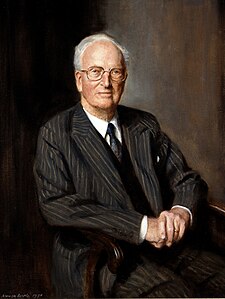Oliver Franks, Baron Franks
|
The Right Honourable The Lord Franks OM GCMG KCB CBE PC DL |
|
|---|---|

Franks in 1990, by Norman Hepple
|
|
| British Ambassador to the United States | |
|
In office 1948–1952 |
|
| Monarch |
George VI Elizabeth II |
| President |
Harry Truman Dwight Eisenhower |
| Preceded by | The Lord Inverchapel |
| Succeeded by | Roger Makins |
| Personal details | |
| Born |
Oliver Shewell Franks 16 February 1905 |
| Died | 15 October 1992 (aged 87) |
| Nationality | English |
| Occupation | Civil servant and philosopher |
Oliver Shewell Franks, Baron Franks OM GCMG KCB CBE PC DL (16 February 1905 – 15 October 1992) was an English civil servant and philosopher who has been described as 'one of the founders of the post-war world'.
Franks was involved in Britain's recovery after the Second World War. Knighted in 1946, he was the British Ambassador to the United States of America from 1948 to 1952, during which time he strengthened the relationship between the two countries. He was given a life peerage on 10 May 1962.
Lord Franks was often called upon by the government of the day to chair important inquiries, and he is best known for his report in the aftermath of the Falklands War which ultimately exonerated the Prime Minister Margaret Thatcher and her government from charges of having failed to heed warning signals of an Argentine invasion.
Franks was educated at Bristol Grammar School and Queen's College, Oxford. He became an Oxford academic, and Provost of Worcester College. He was a moral philosopher by training, serving as Professor of Moral Philosophy at the University of Glasgow between 1936 and 1946.
...
Wikipedia
